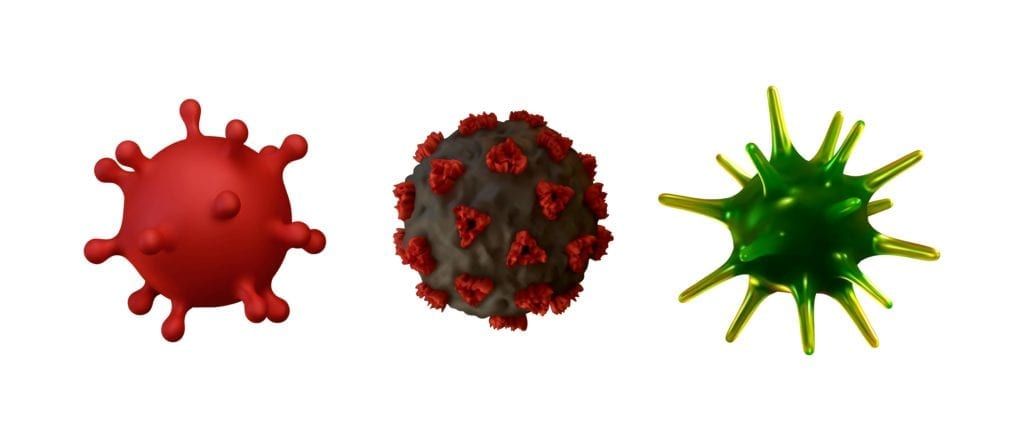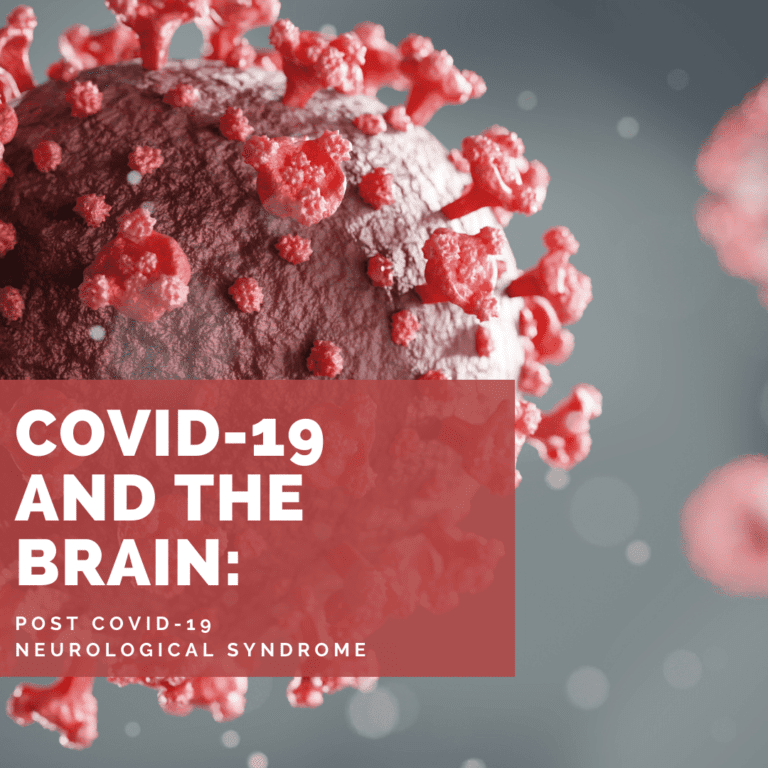Throughout this article series on COVID-19 and the brain, we have carefully evaluated the relationship between the SARS-CoV-2 virus and the neurological system. In part I, we conducted a brief review of the current literature to see what neurologists were saying about the virus. Then in parts II & III, we looked at just how COVID-19 reaches the brain and what neurological symptoms have been observed in patients with the virus. Finally in part IV, we will evaluate the effects of COVID-19 on the neurological system once the virus is no longer active.
The Emergence of Post COVID-19 Neurological Syndrome
According to an article published in the Journal of Neurological Sciences written by Tissa Wijeratne and Sheila Crewther entitled “Post-COVID 19 Neurological Syndrome (PCNS); a novel syndrome with challenges for the global neurology community”, “Recent publications highlight the emerging evidence of a new syndrome–Post Covid-19 Neurological Syndrome (PCNS)”. As mentioned in part II of this article series, the SARS-CoV-2 virus affects more than just the respiratory system. For starters, the presence of the virus initiates an immunological response, which changes the blood and can affect the brain, causing neurological and psychiatric symptoms. Professor Sheila Crewther notes that PCNS is basically the brain responding to the body’s immunological response triggered by the virus.

The collection of symptoms indicative of PCNS is based on recent articles that have detailed the specific neurological effects seen in COVID-19 patients, as well as research obtained during and after past epidemics of a similar nature, specifically severe acute respiratory syndrome coronavirus (SARS) and Middle East respiratory syndrome coronavirus (MERS). Both SARS-CoV and MERS-CoV are highly pathogenic and potentially deadly human coronaviruses, like SARS-CoV-2. Therefore, evaluating the short and long term effects of these viruses can provide insight to hypothesize what effects are to be expected in recovered COVID patients. Nevertheless, it is important to remember that although SARS-CoV, MERS-CoV, and SARS-CoV-2 are similar in some respects, there are still some distinct differences that are unique to SARS-CoV-2 which can affect its short and long term effects on the body and brain.
Post-Viral Syndromes & Neurological Symptoms: SARS and MERS
Past studies of the post-viral symptoms associated with SARS and MERS have found that certain neurological symptoms tend to be more prevalent even after patients have recovered from active infection. In the article titled, “SARS: Prognosis, Outcome, and Sequelae”, KS Chan et. al. look into how SARS affected patients after the acute infection period. that a significant number of patients from Queen Elizabeth Hospital (QEH) in Hong Kong, Prince of Wales Hospital (PWH), and the Guangzhou Institute of Respiratory Diseases showed signs of restrictive lung functioning about six weeks after recovery. Based on the exact results, they hypothesized that respiratory muscle weakness was to blame, not lung damage. Post-SARS generalized muscle weakness was also evaluated in “Impact of Severe Acute Respiratory Syndrome (SARS) on Pulmonary Function, Functional Capacity, and Quality of Life in a Cohort of Survivors” by DS Hui et. al. In this study, researchers hypothesized that respiratory muscle weakness could be due viral induced myositis, long periods of bedrest leading to muscle wasting, and the use of high dose steroids or corticosteroids during treatment.

However, muscle weakness was not only observed in the respiratory muscles. In fact, 50% of patients from the QEH studies were also found to have a decrease in their hand grip strength, suggesting skeletal muscle weakness. Another study, published in May of 2020 in the Yonsei Medical Journal and written by Kyung Soo Hong et al., found another correlation between COVID-19 and the skeletal muscles. This retrospective study of 98 COVID-19 patients and found that 37 were initially admitted to the hospital with complaints of muscle pain, which could indicate viral induced myositis. Unfortunately the effect of SARS and COVID-19 on the skeletal muscles has been associated with diminished cardiopulmonary fitness and muscle wasting. The result is that 97% of SARS patients walk slower than before the virus.
The reason for walking slower could also be attributed to the fatigue associated with post-SARS patients. In the article, “Mental Morbidities and Chronic Fatigue in Severe Acute Respiratory Syndrome Survivors”, Marco Ho-Bun Lam et. al. conducted a long-term study four years after the SARS outbreak that focused on psychiatric morbidities and chronic fatigue. Using the fourth edition of the Diagnostic and Statistical Manual of Mental Disorders, researchers found that 40.3% of SARS survivors had a chronic fatigue problem, with 27.1% actually meeting the diagnostic criteria for chronic fatigue syndrome. Although individuals with chronic fatigue were more likely to have an accompanying psychiatric disorder, chronic fatigue was prevalent in both psychiatric and nonpsychiatric groups. KS Chan et. al. also found that ⅓ of recovered SARS patients from United Christian Hospitals (UCH) in Hong Kong were still experiencing fatigue and problems completing household or workplace tasks a full month after they recovered.
What is Post-COVID-19 Neurological Syndrome?
Post-viral syndromes can occur after any type of virus and are a collection of symptoms that occur as a response to the previous viral infection. The most common symptom is unexplained fatigue that continues to persist after the virus is no longer active. While post-viral syndromes are still being researched, they are believed to be the result of abnormalities in the nervous, immune, and metabolic systems.
Post-COVID-19 Neurological Syndrome (PCNS) is a post-viral syndrome caused by the brain and body’s response to the SARS-CoV-2 virus. As mentioned above, Crewther states PCNS is the brain responding to the body’s immunological response, a fact confirmed by various medical professionals. As a result of an inflammatory response to the SARS-CoV-2 virus, the body produces specialized proteins known as cytokines that have an effect on cellular communication. Since the SARS-CoV-2 virus can weaken the blood-brain barrier, these cytokines can enter and accumulate in the central nervous system.
When cytokines enter the hypothalamus, they can affect temperature regulation, hormone release, sleep cycles, and appetite. They can also cause cognitive abnormalities, as well as severe fatigue. This is how PCNS can cause long-term effects even after the active infection has passed. In some cases, these symptoms may lead to long-term health complications such as heart damage, stroke, lung damage, and chronic fatigue or myalgic encephalomyelitis (ME).
Additionally, a relationship between COVID-19 and neurological deficits has been noted. In the article, “Immediate and Long-Term Consequences of COVID-19 Infections for the Development of Neurological Disease,” Michael T. Heneka et. al. evaluates what is currently known about the relationship between COVID-19 and neurological deficits, stating that individuals who have overcome COVID-19 are at a higher risk of developing cognitive impairment. Researchers attribute the detrimental effects on the central nervous system as being the result of: direct viral encephalitis, systemic inflammation, peripheral organ dysfunction, and/or cerebrovascular changes. While these pathogenic mechanisms are the cause of neurological symptoms during a COVID-19 infection, they can also lead to long-term neurological consequences such as aggravating an existing neurological condition or initiating a new one.
While it is still too early to know the exact effects of this syndrome, current research suggests that PCNS is characterized by the prolonged occurrence of the following symptoms even after the virus has passed:

- Prolonged muscle weakness and myopathy
- An impact on mood causing depression and anxiety
- Chronic fatigue
- Brain fog
- Difficulty concentrating
- Sleep impairment
- Post-traumatic stress disorder (PTSD)
- Dizziness
- Headaches
- Anosmia (loss of smell)
- Cognitive decline
It is important to note that the severity of PCNS symptoms is generally dependent on the severity of the acute infection. This basically means that people who were asymptomatic or who had mild symptoms are more likely to have mild PCNS symptoms, while those who had severe symptoms during the acute infection phase are more likely to have severe PCNS symptoms.
When to See a Neurologist:
Currently, the exact neurological short and long term effects of COVID-19 are still being researched. With that being said, if you are experiencing lingering or unexplained neurological symptoms following your recovery from COVID-19, you should make an appointment with your local neurologist as soon as safely possible. Although some neurological symptoms will eventually resolve themselves, seeking care from your neurologist early on can help you learn to manage or improve your condition.

Dr. Kashouty, a diplomate of the American Board of Psychiatry and Neurology (ABPN), practices general neurology with fellowship trained specialization in clinical neurophysiology. Dr. Kashouty finds the form and function of the nerves and muscles the most interesting part of neurology, which is what led him to specialize in neurophysiology with more emphasis on neuromuscular conditions. He treats all neurological diseases, but his main focus is to treat and manage headaches, movement disorders and neuromuscular diseases.




